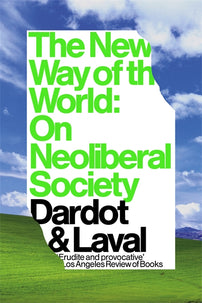The time we need must always be taken; never wait for it to be given
Oliver Davis on neoliberalism's appropriation of the Marxist narrative of historical necessity.

The first essay of Modern Times, ‘Time, Narrative, Politics’, might be understood as a deconstruction of neoliberalism’s eclectic borrowing from the Marxist heritage. In the essay, Jacques Rancière presents his most incisive analysis yet of neoliberal capitalism’s appropriation of ways of seeing and understanding from Marxism. The greater part of the analysis is concerned with the appropriation of the Marxist understanding of time: ‘While the end of the Marxist grand narrative was loudly trumpeted, capitalist and state domination adopted its hard core – the principle of historical necessity – for their own purposes. Submission to this necessity, and comprehension of it, were more than ever made the sole route to any future happiness.’ (p.11)
According to Rancière, the principle of historical necessity is a ‘fiction’, a term which he, as in much of his recent work, doesn’t primarily apply in its usual sense of something imaginary but rather in its etymologically well-grounded meaning of something made or fabricated. What is fabricated is effectively a way of seeing the world, a perspective or interpretive lens. For all that it has been fabricated, a fiction in this sense produces real effects by virtue of the explanation it provides of temporal (causal) interconnectedness between events. ‘Fiction is required whenever a certain sense of reality needs to be produced’ (p.2). We might see fictions in this sense as explanatory constructs. We live in ‘the age of expert management of the present’ (p.4) where armies of professional explainers, specialists in spin and ‘political communication’, advertisers and marketeers, compete to proffer rival fictions of historical necessity to promote the political objectives of their paymasters. Professional explainers are no longer courtiers lurking in the shadows of state power only, though they do still flourish there, but distributed throughout the economic, social and political structure, such that they must be identified, as I have argued elsewhere, with the quiet army of neoliberal capitalism’s helping hands who, in William Davies’s influential analysis, reconstruct the world as a series of ‘constant, overlapping competitions’ (Davies, pp.29-30) by developing ways of seeing as and governing as if the world were just a set of markets.
[book-strip index="1" style="buy"]Consider a recent speech by former Bank of England governor Mervyn King, in which he declares that leaders “need to give us a clear narrative” of how inflation, slowdown and the cost of living crisis have come about. By ‘narrative’ King partly meant a confession, of how ‘quantitative easing’ by central banks has produced the present crisis; this euphemistically named remedy was already of course a desperate response to the preceding crisis of capitalism. The game of expert management of the present highlighted by Rancière is legible almost on the surface of King’s remarks: an ignorant ‘us’, the governed, must be placated with some credible explanation if we are to bear impending hardship without rising up to political decision against the economic system of globalised free market capitalism which has produced it. King was saying, in effect: do have the decency to make up a story that is at least plausible, or capitalism will pay the price – give ‘us’ an explanatory fiction which we can at least half-believe, cynically, or face the political and social consequences. The fact that the dynamics of the game of explaining sit exposed so close to the surface of King’s counsel testifies not only to the outspoken temperament and, some would say, brazen effrontery of a former central banker who oversaw QE while in office, but also, I believe more hopefully, to a sense of the peril now confronting the whole craft of expert explaining that has developed to administer domination.
Rancière suggests that this craft of expert explaining, allied with the management of the present, implies a division between people of two distinct types, who in turn live out two distinct experiences of time: on the one hand, the time of the people of action, the time of History and the wise explainers who can account for the world. On the other, the repetitive time, the repeated clash of heterogeneous temporalities characteristic of precarious employment, of those to whom things happen and to whom the reason for their domination must constantly be explained if they are not suddenly to find it intolerable. The more critical the situation – and one of Rancière’s more Marxist claims in this essay, as in the work of Naomi Klein and others, is that capitalism is increasingly ruling by way of the governmental technique of crisis-management – the greater the reliance on expert explaining and the more intense the consolidation of intellectual, social and political inequality enacted through the reproduction of this explanatory scenario.
In our consensual times, the fiction of historical necessity inherited from Marxism has been re-expressed, Rancière suggests, chiefly in terms of the need for ‘reform’: ‘reform’ is a ‘master-signifier’ (p12) of historical necessity deployed to liquidate ‘the legacies from an archaic past that went by the names of labour codes, employment legislation, social security pension systems, and public or other services’ (p13). This righteous discourse of ‘reform’ recycles, Rancière argues, disdainful caricaturing by nineteenth-century Marxism of those artisans and petit-bourgeois whose selfish attachment to outdated social forms and benefits was decried as blocking the advent of a better future for all in communism. Renamed ‘privileges’, the historic gains of working-class struggle accumulated over recent generations must now be abandoned, the explainers tell us, in the interests of a better future for all. The French call these hard-won gains les acquis sociaux; there is no equivalent term of any currency in the Anglosphere.
As well as its master-signifier, the fiction of historical necessity, neoliberal capitalism has arguably also appropriated a generalised victimology from Marxism: ‘the grand narrative of a wrong inflicted and justice promised to a universal victim’ (p.1). Although he did not use the term, the prominence of a degenerate ‘victimology’ was something Rancière objected to in the work of the so called nouveaux philosophes (André Glucksmann, Bernard-Henri Lévy, Alain Finkielkraut and others), when he critiqued their work as it emerged in the mid-1970s. One dimension of this supplanting of Marxism by generalised victimology is explored from the perspective of critical queer and sexuality studies by me and Tim Dean in our recent book. Similarly, originally emancipatory grassroots movements such as feminism, anti-colonialism and anti-racism, LGBTQ rights and even environmental justice are increasingly understood within the frame of a generalised victimology as they are domesticated into institutional ‘agendas’ and ‘values’ to virtue-wash corporations, institutions, governments, and individuals above all committed to their own competitive self-enrichment.
[book-strip index="2" style="display"]Rancière’s analysis suggests that the management of domination is to a large extent about managing the time of the dominated. Among the dominated today are those in precarious work, with its associated administrative burden, including above all the intensive self-administration required to move abruptly between different organisations, places and temporalities. It is convenient for the system of domination that those most disadvantaged by it are also most preoccupied with navigating a plurality of byzantine regulations, expectations, needs and obligations. This is social control by way of administrative saturation. Systems theorist Niklas Luhmann once argued that the proliferation of law increased freedom, as the essential incoherence of the overall system meant that individual provisions can be invoked defensively to counter others. Not so with the proliferation of bureaucratic ‘guidance’, regulation and ‘best practices’ on which the domination of neoliberal governance relies to manage the time of the dominated, since the control which these self-multiplying measures exert is seldom justiciable.
Public institutions of democracy – including those who train and credentialise the professional explainers – are being comprehensively undermined, ‘termite-like’ from within, as Wendy Brown argued, by the incremental encroachment of those sacrosanct ‘processes’ beloved of bureaucratic management, by tumescence of their internal petty-bureaucracy, both human and machinic, and the ever-expanding tribute of time required to service these apparently efficient workflows, allocations, targets, standards, strategies and policies and so forth, not to mention the ghoulish metabureaucracy of ‘assurance’ and ‘audit’ which holds everything together. It is by overfilling and thereby disciplining the time of a workforce that the proletarianisation of vocational labour is increasingly being effected across a range of social institutions which formerly, at least intermittently, served real democracy by furnishing us with critical perspective. This is an intensification of control but, intriguingly, it is not direct control in the particular sphere of the political but rather indirect control of that sphere via the differentiated management and distribution of the overall quantum of administered time.
Filling up the day of the dominated is also a way of leaving them with no time for the critical reflection essential to a functioning democracy. Jonathan Crary’s analysis of 24/7 capitalism could productively be read alongside Rancière. Also worth mentioning is the movement in France spearheaded by philosopher Barbara Cassin and psychoanalyst Roland Gori, called the Appel des Appels, which also questions this direction of travel. Rancière’s own path of resistance to what we might call the administration of time, to administered time (which might well be seen as a wider form of the ‘Prison Time’ of homogeneous successive units identified by Michael Hardt in his reading of Jean Genet), was already legible in Proletarian Nights [1981], wherein the worker intellectuals and worker poets of the nineteenth century decided to spend the nights allotted to them as time to recuperate before the following day’s labour on their own aesthetic and political projects. The time we need must always be taken; never wait for it to be given.
If one target of Rancière’s in this polemical essay is the ‘crudely positivistic notion of time’ (p.8) implied in neoliberal capitalism’s appropriation of the Marxist fiction of historical necessity, it might be objected that the temporality of climate emergency is a real threat taking place in one time, not in those heterogeneous, anachronistic and unruly temporalities his analysis seems to favour. Yet free market capitalism’s basic principle of competitive self-enrichment is already perpetuating ecocide and threatening the very survival of the human species. The temporality favoured by governmental managers of this ongoing disaster and their expert explainers, which implies it awaits in some not-too-distant future unless urgent action is taken, is already a mystification of the present which proposes that the solution lies in an optimisation of the existing order. In their dystopian climate fictions, filmmakers and writers are already showing us visions of how a functionally optimised existing order will try to manage climate emergency technocratically, for example in Wendy Delorme’s remarkable Viendra le temps du feu (2021), set in a nationalist-populist state in which constant war is being waged against immigrants from the south who seek access to its scarce natural resources. Far from showing the redundancy of Rancière’s analysis, the failure of representative national democracies under free market conditions to adequately apprehend the temporality of climate emergency confirms his intuition that liberalism’s order of explanatory rationalisation only ever promises ‘optimisation of the existing order’ (p.12) – in this case, never enough of a break with it to prevent mutually assured environmental destruction.
I would like to say a last word about Gregory Elliott’s translation, which is exceptionally good. It tracks the argumentation of the original closely, manages to render Rancière’s precise but pointedly discursive rather than narrowly technical writing into articulate and arresting English, without any flattening of stylistic and conceptual acuity.
Oliver Davis works as a teacher and researcher at Warwick University. He is the author of Jacques Rancière (Polity, 2010), editor of Rancière Now (Polity, 2013) and, more recently, with Tim Dean, the co-author of Hatred of Sex (Nebraska, 2022), a provocative extrapolation from Rancière’s Hatred of Democracy addressing contemporary politics and critical sexuality studies. He currently serves as Executive Editor of the journal Modern & Contemporary France.





